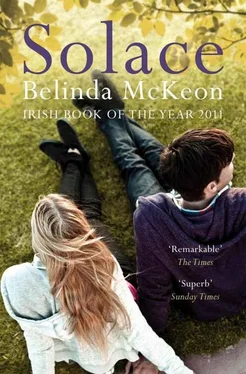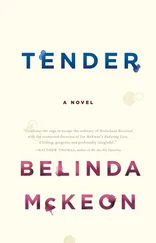‘Don’t be bold,’ he said to her, in a warning tone, and she howled as though he had dipped her low into a flame.
He put her into the cot. She sat, and then she stood, and then she lay down and curled herself into a ball, and all the time she screamed, and all the time she looked up at him with a twist of pure anger on her face. The dripping tears looked almost comically huge. The snot ran into her mouth, and when he tried to reach towards it with the edge of the blanket, the roar of her outrage was so loud and so overpowering that he could not help it.
‘Jesus tonight,’ he said, and the laughter took him so fully that he almost collapsed.
*
A tractor and a few pieces of machinery stood in the yard. They were not new: Frankie must have brought them from Caldragh. Frozen, clouded with white, the tractor’s windscreen looked as though it was not one pane of glass but a thousand tiny chips, held together for one last moment within the square of the frame.
He walked to the larger shed. He could hear the cattle inside. The sound they made was simply the sound of their being there, sleeping up against each other, resting on their knees and their stomachs in the straw, chewing on whatever they still had to chew on, breathing on each other and on the night.
Inside the shed it was much darker; the moonlight did not reach in here. But Mark’s eyes soon grew accustomed, and he could see how Frankie had laid the place out. The stalls were built on a step up from the slatted ground, so that the animals could sleep on the warmer ground, away from where they pissed and shat. The gates were neat and properly latched. The animals had room to rise and walk around one another, as some of them, noticing him, now started to do. Behind him, he heard a patter, a low call. He turned. The calf was young, maybe a month old. It was loose. It came confidently to him, and it looked up at him with eyes that were bright in the half-light. It was a Friesian, white splashed on its forehead and across its back.
‘Where did you come from?’ Mark said.
The calf gave a warbling grunt and butted his hand with its small, hard head.
‘Take it easy,’ Mark said, kneading its crown, his eyes searching the darkness behind for its mother.
*
Or he had thought he was laughing. Or he had meant, at least, to laugh. It was only when the child stopped her own crying and changed the way she was looking at him — changed from a screaming fury to a curiosity that caused her to pull herself up on the cot bars and stare — that he realized that he was not laughing; he was crying, and he was crying hard. He was sobbing, and he was shaking, and he was getting snot on himself, and he was covering his face with his hands, and he was trying to get a hold of himself, but it was something outside himself that had the hold on things; it was something outside his power that was pushing up from his gut and his heart and his lungs. He tried to think of what was causing it, and all he could think of were the last words he had said, and then in the same moment he understood it, because they had never been his words. They had been Maura’s. They had been Maura’s way of letting out anger, or frustration, or sometimes a loud, long laugh at the ridiculousness of the day or the night or the world. Jesus tonight. Jesus tonight. Jesus tonight. She had said it to herself. She had said it to Tom or the children. She had said it to the empty air. She had said it while she was cursing whatever it was she was cursing, but at the same time she was always fixing or settling or sorting out the same thing: she was dressing a child, or closing a door, or knowing what to do with a form, or turning to Tom and making him feel less angry or less worried or less frightened about whatever it was he had on his mind. She had said it, and he had never heard anyone else saying it, and she had said it in a tone and a voice that were only her own. And, for a moment, that voice had been with him in the room.
The child let him lift her out of the cot when he calmed himself. He took her downstairs. Mark had left new food in the fridge.
‘Otherwise you’d be eating rashers and sausages,’ he said to the child, but when he looked more closely, nothing seemed like the kind of thing you would give to a child who had woken up crying at midnight: grapes, and a few pots of yoghurt, and a pack full of thick strips of cheese, and two cartons of juice. Surely something warm was better for her, he thought, and so he closed the fridge and opened the cupboard. He opened a can of beans, and he put her down to play on the floor. While she threw her arms around the dog’s neck and tried to get up on its back, he warmed the beans in a saucepan, and all the time he talked to the dog in a friendly tone, sympathizing with her, praising her, in the hope that she would not get impatient and snap at the child.
‘That’s the girl, now,’ he said, and the child looked up as though he had been talking to her.
He fed her with a teaspoon. She frowned, at first, at the taste of the beans, but soon she wanted him to feed her more quickly, to feed her the whole bowl, and she swung her legs and bounced on his lap as though to hurry him along.
‘That’s nice,’ he said to her, and she blinked at him. ‘Isn’t that nice?’
She took a bean from the bowl and offered it, on the palm of her hand, to the dog. The dog tipped the bean with its nose and then took it on its tongue. It looked at her, ready for more, but she offered the next bean to Tom, balancing it between her fingertips and putting it to his lips. When he took it from her she laughed at him and pointed to the dog.
‘The doggie gets her own food,’ Tom said, and offered the child another teaspoon of beans, but she shook her head and once again pointed to the dog.
‘All right, whatever you say,’ Tom said, and he rose with her in his arms and went back to the same cupboard to take down the can of food for the dog. He sat the child on the counter; she reached a hand to the brown mixture he spooned on to a side plate. He lifted it up out of her reach. As he gave the plate to the dog, the child shouted at him; she gave him a name he could not make out.
‘Come on,’ he said, and he took her up again and brought her to the couch. She would not sit with him, but stood beside him, bouncing unsteadily on the cushions, gripping the couch like a drunk holding on to a wall.
*
The calf called out again. From behind Mark, one of the other cattle answered it, or echoed it; several of them had gathered now at the feeding rails, nosing through the scattered hay and tearing clumps away with their teeth. But some were not eating: they were just standing, staring at him, waiting to see what he would do.
Now he could make out the section in the opposite corner of the shed where the calf had come from. It was a small, gated-off rectangle away from the slatted ground. There were other animals in there, he saw, as he moved closer; two cows and another, still smaller calf. He wondered at the calves being born so late in the year, so deep into the winter; he was surprised at Frankie’s carelessness — until he realized it could not have been Frankie’s carelessness. Those cows would have been heavy with calf when Frankie brought them here.
He looked down at the calf. Though it was too young yet to fodder, it was sniffing at the open end of the trough, looking up at the older animals as though to taunt them. They responded with indignant noises as it nudged through the rustling whorls of hay.
‘All right,’ Mark said, and reached for the calf ’s tail, twisting it gently, so that the animal jolted for a moment but then allowed itself to be guided away from the trough.
‘That’s you done now,’ he said, and he moved it slowly back towards its pen. A long, demanding bawl sounded from one of the cows; she was up against the gate, pacing now within the small enclosure, but she could not get out.
Читать дальше












